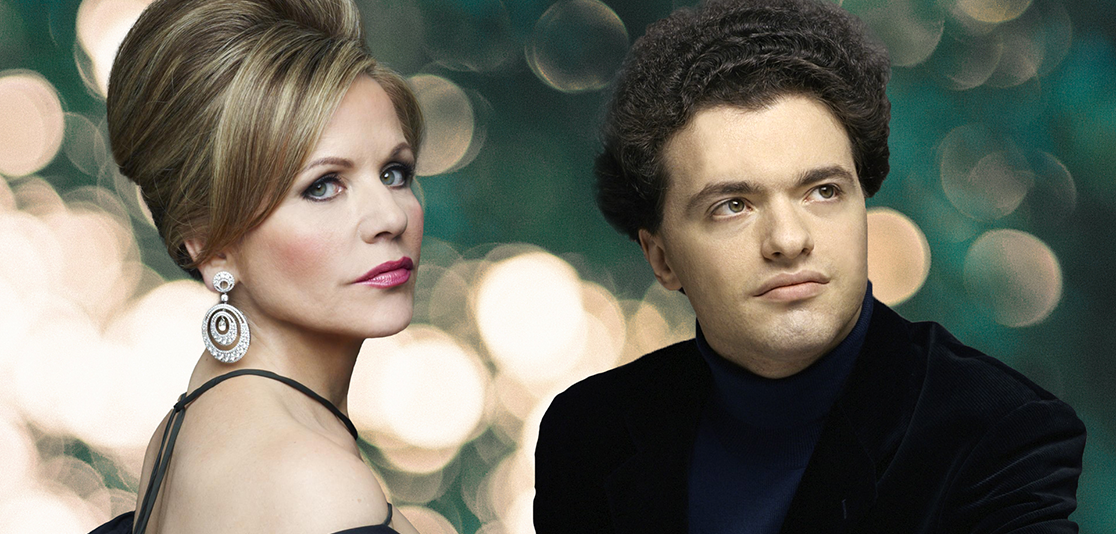The Music Coming Our Way From Renée Fleming and Evgeny Kissin
May 17, 2023

You may be familiar with the detailed program notes The Gilmore provides in its concert programs for classical presentations. Many are written by Zaide Pixley, PhD, Professor Emerita, Kalamazoo College. In preparation for our season-ending concert, Ms. Pixley dug deep to give us impressions and history about the composers and music to be performed by Renée Fleming and Evgeny Kissin on May 27. Following is an excerpt from the program.
Buy your concert tickets today so you can enjoy the full concert experience, and arrive early for a concert preview by Ms. Pixley on the composers, artists and program for the evening. The talk starts at 7 pm and is included with your ticket.
Franz Schubert’s songs depict moments in time with astonishing expression and variety. In Die Vögel (The Birds), we hear lighthearted birds soaring above the fray, mocking the humans below. With a soaring vocal line supported by a cheerful, bouncing accompaniment, Schubert brings the scene to life. In Lied der Mignon: Nur wer die Sehnsucht kennt (Mignon’s Song: Only Those Who Know Longing), the character of Mignon, through a series of misfortunes, has been abandoned. This mournful song expresses her desolation in chromatic, drooping vocal lines, punctuated by a passionate outburst before her pain returns. Composed by Schubert when he was just 18, Rastlose Liebe (Restless Love) reveals a tormented lover caught up in the throes of despair, yet Schubert’s music conveys breathless, impetuous joy.
Over forty years, Franz Liszt wrote more than eighty songs in six different languages. Not just prolific, he was fast – writing Freudvoll und Leidvoll (Full of Joy, Full of Sorrow) in one day. It is music of extremes: joy and sorrow, trembling and exultation. The rhythm of the opening lines of Goethe’s poem, which provides the text, are directly mirrored in the music. A lover suffers, but only the soul that loves is happy. Composed to another text by Goethe, Über allen Gipfeln ist Ruh (Over Every Mountaintop Lies Peace), Lizst reveals nature coming to life: peace on every tree-top, birds hushed in the wood, scarcely a breath of wind. The singer speaks, in a hushed tone, painting a picture, quietly supported by the piano.
When Sergei Rachmaninoff wrote the song Siren (Lilacs) in April 1902, he was about to be married, and in the twelve songs of Op. 21, he expressed his delight and joy – and, as he told his prospective bride, a way to pay for their European honeymoon. Breezy, light, and full of movement, with a soaring melody and delicate but soulful accompaniment, Lilacs brilliantly evokes love in spring and blooms like its namesake.
At age 35, Henri Duparc withdrew from active life due to ill health, and destroyed much of his work, leaving behind a handful of orchestral and chamber works, and thirteen songs. In their feeling for poetic atmosphere, they are considered to be an essential contribution to the French repertoire. A voluptuously beautiful song, Extase (Ecstasy) tells of the joys of love. Its supple vocal line, intensely expressive, is enhanced by delicious tonal shifts, as gradually the pale lily becomes “sweet death” on the beloved’s breast. The concert ends with Le Manoir de Rosemonde (The Manor of Rosemonde), set to a poem by Robert de Bonnières, novelist and journalist. It depicts a feverish, fatal quest to find the mysterious domain of Rosamonde. She was a favorite subject of legends and stories, and may represent the long-ago mistress of King Henry II. When their relationship was discovered, she fled to a nunnery. In this song the text is dire, the music agitated, even hysterical, as Rosamonde’s suitor leads us on a chase, through quagmires and on hidden paths, ultimately to his desolate, lonely death. Love is as bitter as a dog bite, he declares. Love is dangerous, and the pounding, agitated music tells us so.
